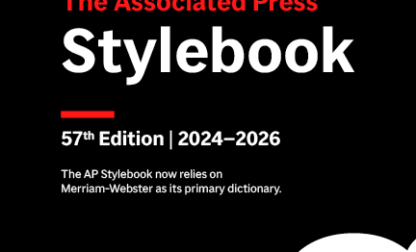Asian American terms added to AP Stylebook
During a virtual panel at the ACES: The Society for Editing national conference on Friday, AP Stylebook Editor Paula Froke announced new Asian American-related Stylebook entries, among other updates.
The Definitive SourceProducts and Services
Asian American terms added to AP Stylebook
During a virtual panel at the ACES: The Society for Editing national conference on Friday, AP Stylebook Editor Paula Froke announced new Asian American-related Stylebook entries, among other updates.

The guidance is immediately available to AP Stylebook Online subscribers.
Asian, Pacific Islander, AAPI, Stop AAPI Hate and anti-Asian sentiment have all been added to the Stylebook. AP’s previous entry on Asian American now adds that Pacific Islanders should not be described as Asian Americans, Asians or of Asian descent; and that Asian should not be used as shorthand for Asian American when possible.
Froke also presented a revised entry on disabilities, which includes guidance to use care and precision when writing about disabilities and people with disabilities; ask people how they want to be described; be specific about types of the type of disability, or symptoms; and avoid using disability-related words lightly or in unrelated situations and writing that implies ableism.
Additional entries presented at the meeting that are now available on AP Stylebook Online include:
- antisemitism, antisemitic: Prejudice or discrimination against Jews. A change from previous style (anti-Semitism and anti-Semitic).
- injuries: They may be suffered, sustained or received. Often, simpler wording is possible: She was injured in the crash, rather than she sustained injuries in the crash.
- trauma: Avoid the vague medical jargon trauma when it is possible to use more specific words like injury, wound, bruise or shock. Acceptable in medical diagnoses such as traumatic brain injury or post-traumatic stress disorder, and in references to emotional injury.
- antiviral, antivirus: No hyphen in either term, an exception based on common usage to general guidance to hyphenate anti- terms unless they have specific meanings of their own.
- anti-vaxxer: do not use this term for someone who opposes vaccinations. If necessary in a direct quotation, explain it.
- long-hauler: Sometimes used to describe a person or group of people who do not fully recover from COVID-19 and have lingering symptoms, including fatigue, shortness of breath, “brain fog” and trouble sleeping. Use sparingly and describe the long-term health problem if relevant.
The AP Stylebook is the definitive resource for journalists and a must-have reference for writers, editors, students and professionals, providing fundamental guidelines for spelling, language, punctuation, usage and journalistic style.
AP Stylebook Online is updated continually throughout the year. The digital product is a searchable and customizable version of the AP Stylebook, offering bonus features including Ask the Editor, Topical Guides and Pronunciation Guide.



